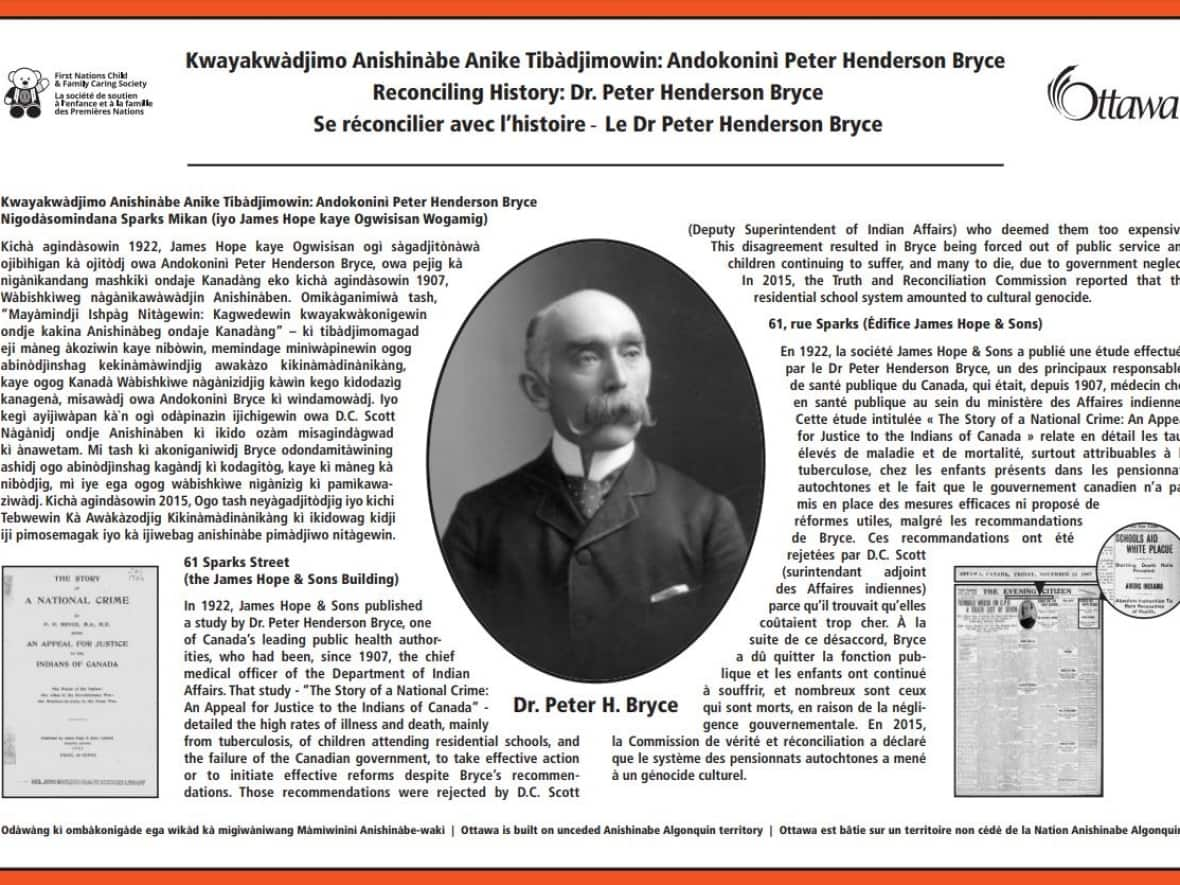Doctor who blew whistle on atrocities of residential schools honoured in Ottawa

WARNING: This story contains distressing details.
One hundred years ago, the former chief medical health inspector of what was then known as Canada's Indian Affairs department walked through the doors of a publishing house in Ottawa.
He carried a manuscript called A National Crime. It was published in 1922 detailing the appalling and deadly health conditions in government-funded residential schools.
On the second National Day for Truth and Reconciliation, Dr. Peter Bryce is being honoured with a plaque in front of the very same building of the publishing house that released his work, James Hope & Sons, at 61 Sparks St.
"It allows us to more critically think about our history and to uplift and celebrate some of these great people who resisted all the wrongdoing," said Cindy Blackstock, executive director of the First Nations Child and Family Caring Society and a member of the Gitxsan Nation.

Similarities between Blackstock and Bryce
Blackstock, whose organization is paying for the plaque, said she sees parallels between Bryce's work and her own advocacy for Indigenous children's rights.
Bryce first blew the whistle in 1907, explaining how the practices in these institutions and underfunding of health-care services for the children who attended them were leading to death rates of 50 per cent.
He reported that inadequate sanitation, poor ventilation and overcrowded classrooms and dormitories were leading to major outbreaks of disease, including tuberculosis.
He was ignored.
The federal government of the day stonewalled him by cutting his research funding, barring him from speaking at medical conferences and eventually pushing him out of his job.
Blackstock filed a human rights complaint against the federal government in 2007 — 100 years after Bryce first spoke up — accusing it of underfunding child welfare services and denying essential health services to First Nations children.
"Just like in Dr. Bryce, when we brought the case and we were showing the evidence that Canada was discriminating against children, they retaliated," she said.

Blackstock was surveilled by the government and she continues to fight for compensation for children in court — 15 years later.
"That story is the same. Where I hope our stories are departing is that the Canadian public is not as much in the dark as they were back then," she said.
Marie Wilson, who served as a commissioner with the Truth and Reconciliation Commission from 2009 until 2015, said the plaque presents an opportunity to inch Canadians forward to a deeper way of understanding their country.
"It's really a story about what happens when you ignore the facts put before you and what happens when you act as if the lives of some children are less valuable than the lives of other children, and when you do that along racial lines," she said.
"That has been the history of residential schools and their consequences."
Blackstock said she also hopes the plaque dispels myth that people in the last century didn't know any better and no one was outraged.
"None of that was true," Blackstock said.
"What I hope people take away from seeing it is that Ottawa really is the command and control of residential schools."
'When the headlines die, the children do too'
The Caring Society's theme for Sept. 30 this year is resistance.
It's working with a youth group, the Assembly of Seven Generations, to hold public historical tours throughout Sparks Street in Ottawa to point out buildings where key decisions about residential schools were made.
The group's co-founder, Gabrielle Fayant, said the effects of the institutions are still felt today through intergenerational trauma, and the overrepresentation of Indigenous peoples in the criminal justice and child welfare systems.
"This isn't just something that happened in the past," Fayant said.
"It hasn't fully been settled. It hasn't fully been healed. It's an ongoing genocide."
More than 150,000 First Nations, Métis and Inuit children were forced to attend government-funded residential schools operated by the Catholic, Anglican and other churches between the 1870s and 1997.
In 2015, the Truth and Reconciliation Commission reported that the residential school system amounted to cultural genocide.
Last July, Pope Francis declared that what happened at the institutions was genocide after issuing a historic apology on Canadian soil.

To mark the National Day for Truth and Reconciliation, the Caring Society played a CBC Radio documentary, first aired on Sept. 30, 1978, about Bryce and then-deputy superintendent of the Department of Indian Affairs, Duncan Campbell Scott, who rejected Bryce's recommendations. The documentary was presented again on Thursday evening to the public at the Beechwood Cemetery in Ottawa, where Bryce and Scott are both buried.
"The lesson from history we need to draw from Dr. Bryce is that when the headlines die, the children do too," Blackstock said.
"That is our opportunity today … We cannot turn the page because public pressure makes all the difference."
Support is available for anyone affected by their experience at residential schools or by the latest reports.
A national Indian Residential School Crisis Line has been set up to provide support for survivors and those affected. People can access emotional and crisis referral services by calling the 24-hour national crisis line: 1-866-925-4419.
Mental health counselling and crisis support is also available 24 hours a day, seven days a week through the Hope for Wellness hotline at 1-855-242-3310 or by online chat at www.hopeforwellness.ca.


